
Help! is the fifth studio album by the English rock band the Beatles and the soundtrack to their film of the same name. It was released on 6 August 1965 by Parlophone. Seven of the fourteen songs, including the singles "Help!" and "Ticket to Ride", appeared in the film and take up the first side of the vinyl album. The second side includes "Yesterday", the most-covered song ever written. The album was met with favourable critical reviews and topped the Australian, German, British and American charts.

My Generation is the debut studio album by English rock band the Who, released on 3 December 1965 by Brunswick Records in the United Kingdom, and Festival Records in Australia. In the United States, it was released on 25 April 1966 by Decca Records as The Who Sings My Generation, with a different cover and a slightly altered track listing. Besides the members of the Who, being Roger Daltrey (vocals), Pete Townshend (guitar), John Entwistle (bass) and Keith Moon (drums), the album features contributions by session musician Nicky Hopkins (piano).
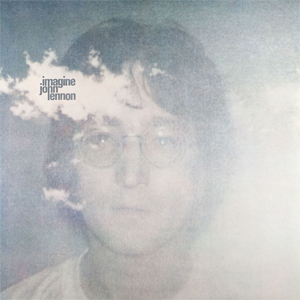
Imagine is the second solo studio album by English musician John Lennon, released on 9 September 1971 by Apple Records. Co-produced by Lennon, his wife Yoko Ono and Phil Spector, the album's elaborate sound contrasts the basic, small-group arrangements of his first album, John Lennon/Plastic Ono Band (1970). The opening title track is widely considered to be his signature song.
"How Do You Sleep?" is a song by English rock musician John Lennon from his 1971 album Imagine.

Jamming with Edward! is a 1972 album by three Rolling Stones band members accompanied by Nicky Hopkins and Ry Cooder.
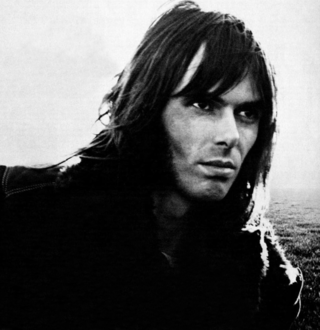
Nicholas Christian Hopkins was an English pianist and organist. He performed on many popular and enduring British and American rock music recordings from the 1960s to the 1990s, most notably on songs recorded by the Rolling Stones, the Kinks, the Who, the Beatles, the Steve Miller Band, Jefferson Airplane, Rod Stewart, George Harrison, John Lennon, Paul McCartney, Ringo Starr, The Hollies, Cat Stevens, Carly Simon, Harry Nilsson, Joe Walsh, Peter Frampton, Jerry Garcia, Jeff Beck, Joe Cocker, Art Garfunkel, Badfinger, Graham Parker, Gary Moore, Quicksilver Messenger Service and Donovan. He is widely considered to be one of the greatest studio pianists in the history of popular rock music.

"Jealous Guy" is a song written and originally recorded by the English rock musician John Lennon from his second studio album Imagine (1971). Not released as a single during Lennon's lifetime, it became an international hit in a version by Roxy Music issued in early 1981; this version reached #1 in the UK and Australia, and was a top 10 hit in several European countries. Lennon's own version was subsequently issued as a single, and charted in the US and UK.
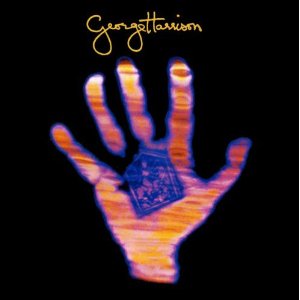
Living in the Material World is the fourth studio album by the English musician George Harrison, released in 1973 on Apple Records. As the follow-up to 1970's critically acclaimed All Things Must Pass and his pioneering charity project, the Concert for Bangladesh, it was among the most highly anticipated releases of that year. The album was certified gold by the Recording Industry Association of America two days after release, on its way to becoming Harrison's second number 1 album in the United States, and produced the international hit "Give Me Love ". It also topped albums charts in Canada and Australia, and reached number 2 in Britain.
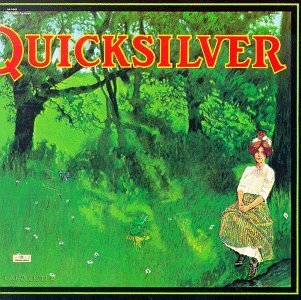
Shady Grove is a 1969 studio album by Quicksilver Messenger Service.
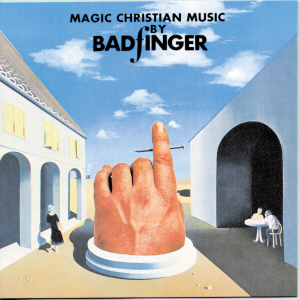
Magic Christian Music is the second studio album by the British rock band Badfinger, released on 9 January 1970 on Apple Records. It was their first release under the Badfinger name, having previously released the album Maybe Tomorrow in 1969 under the name The Iveys. It includes the band's first international hit, "Come and Get It", written and produced for them by Paul McCartney.

"Slip Kid" is a song from the Who's seventh album, The Who by Numbers. Written originally for Pete Townshend's shelved Lifehouse rock opera, "Slip Kid" was revived in 1975. The song was originally written as a warning about the music business, though Townshend has pointed out the song's relevance in different contexts. The song was released as a single in the US, backed by "Dreaming from the Waist", but failed to chart.

"Gimme Some Truth" is a protest song written and performed by John Lennon. It was first released on his 1971 album Imagine. "Gimme Some Truth" contains various political references emerging from the time it was written, during the latter years of the Vietnam War. Co-produced by Phil Spector, the recording includes a slide guitar solo played by George Harrison, Lennon's former bandmate in the Beatles.

"Wake Up My Love" is a song by the English rock musician George Harrison from his tenth studio album Gone Troppo (1982). Released as the A-side of the album's lead single, it peaked at number 53 in the United States but failed to chart in Britain. Harrison included the track on his 1989 compilation album Best of Dark Horse.

"Oh Yoko!" is a 1971 song written and performed by John Lennon. It was first released on his album Imagine, and was later included in the greatest hits compilation Working Class Hero: The Definitive Lennon.
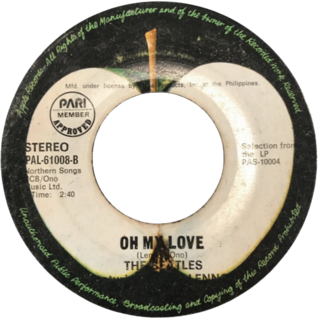
"Oh My Love" is a song written by John Lennon and Yoko Ono that appeared on Lennon's Imagine album in 1971.

"Nineteen Hundred and Eighty-Five" is a song by the British–American rock band Paul McCartney and Wings, released as the final track on their 1973 album Band on the Run. It has been featured on the 2001 documentary DVD Wingspan and Paul McCartney and Wings' 1974 TV special One Hand Clapping. A 2016 remix of the song was nominated for a Grammy Award. The song was referenced in Brett Easton Ellis’s novel Glamorama, driving a group of fictional supermodels to extreme terrorist acts.

Tommy is a soundtrack album by The Who with contributions from numerous artists. The soundtrack was used in the 1975 Tommy film that was based on the original album that was released by The Who in 1969. Pete Townshend oversaw the production of this double-LP recording that returned the music to its rock roots, and on which the unrecorded orchestral arrangements he had envisaged for the original Tommy LP were realised by the extensive use of synthesiser.

Let It Rock: The Jerry Garcia Collection, Vol. 2 is an album by the Jerry Garcia Band. It was recorded live at the Keystone in Berkeley, California, on November 17 and 18, 1975. It was released by Rhino Records as a two-disc CD on November 10, 2009.
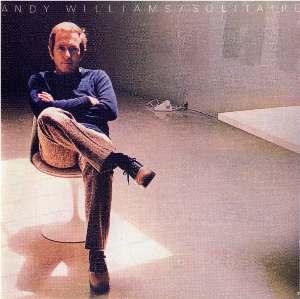
Solitaire is the thirty-first studio album by American pop singer Andy Williams, released in the fall of 1973 by Columbia Records and was an attempt to move away from his formulaic series of recent releases that relied heavily on songs that other artists had made popular.

The Tin Man Was a Dreamer is a studio album by English musician Nicky Hopkins, released in 1973 on Columbia Records. While Hopkins had long been well known for his distinctive, melodic style on piano and Wurlitzer electric piano, the album provided a rare opportunity to hear him sing, unlike his earlier solo releases The Revolutionary Piano of Nicky Hopkins and Jamming with Edward! The album was co-produced by Neil Young's regular producer, David Briggs, and featured contributions from George Harrison, Mick Taylor, Klaus Voormann and Hopkins's fellow Rolling Stones sidemen Bobby Keys and Jim Price.



















